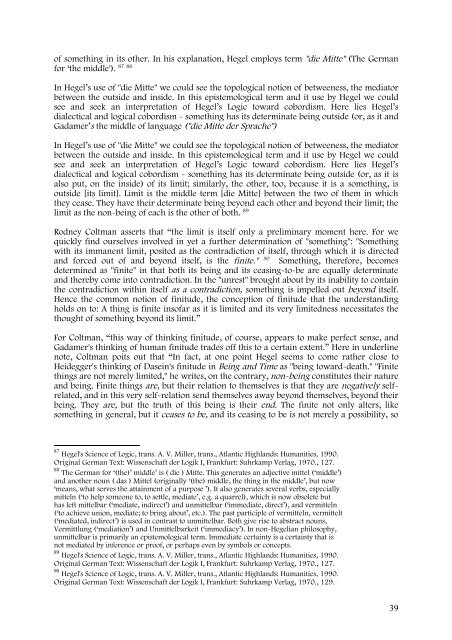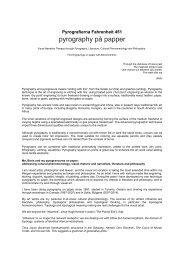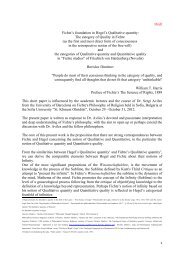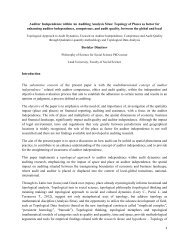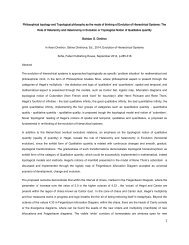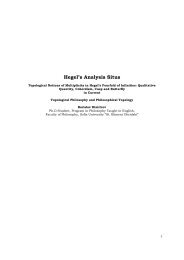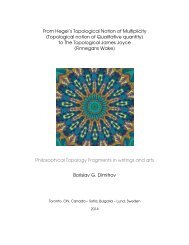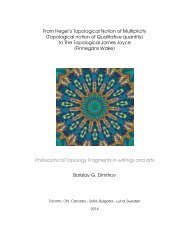Topological Ontology and Logic of Qualitative quantity
Qualitative quantity and BFO (Basic Formal Ontology) of /Barry Smith/ and YAMATO (Yet Another More Advanced Top-level Ontology) of /Riichiro Mizoguchi/
Qualitative quantity and BFO (Basic Formal Ontology) of /Barry Smith/ and YAMATO (Yet Another More Advanced Top-level Ontology) of /Riichiro Mizoguchi/
- No tags were found...
Create successful ePaper yourself
Turn your PDF publications into a flip-book with our unique Google optimized e-Paper software.
<strong>of</strong> something in its other. In his explanation, Hegel employs term "die Mitte" (The German<br />
87 88<br />
for ‘the middle').<br />
In Hegel’s use <strong>of</strong> "die Mitte" we could see the topological notion <strong>of</strong> betweeness, the mediator<br />
between the outside <strong>and</strong> inside. In this epistemological term <strong>and</strong> it use by Hegel we could<br />
see <strong>and</strong> seek an interpretation <strong>of</strong> Hegel’s <strong>Logic</strong> toward cobordism. Here lies Hegel’s<br />
dialectical <strong>and</strong> logical cobordism - something has its determinate being outside (or, as it <strong>and</strong><br />
Gadamer’s the middle <strong>of</strong> language ("die Mitte der Sprache")<br />
In Hegel’s use <strong>of</strong> "die Mitte" we could see the topological notion <strong>of</strong> betweeness, the mediator<br />
between the outside <strong>and</strong> inside. In this epistemological term <strong>and</strong> it use by Hegel we could<br />
see <strong>and</strong> seek an interpretation <strong>of</strong> Hegel’s <strong>Logic</strong> toward cobordism. Here lies Hegel’s<br />
dialectical <strong>and</strong> logical cobordism - something has its determinate being outside (or, as it is<br />
also put, on the inside) <strong>of</strong> its limit; similarly, the other, too, because it is a something, is<br />
outside [its limit]. Limit is the middle term [die Mitte] between the two <strong>of</strong> them in which<br />
they cease. They have their determinate being beyond each other <strong>and</strong> beyond their limit; the<br />
limit as the non-being <strong>of</strong> each is the other <strong>of</strong> both. 89<br />
Rodney Coltman asserts that “the limit is itself only a preliminary moment here. For we<br />
quickly find ourselves involved in yet a further determination <strong>of</strong> "something": "Something<br />
with its immanent limit, posited as the contradiction <strong>of</strong> itself, through which it is directed<br />
<strong>and</strong> forced out <strong>of</strong> <strong>and</strong> beyond itself, is the finite." 90 Something, therefore, becomes<br />
determined as "finite" in that both its being <strong>and</strong> its ceasing-to-be are equally determinate<br />
<strong>and</strong> thereby come into contradiction. In the "unrest" brought about by its inability to contain<br />
the contradiction within itself as a contradiction, something is impelled out beyond itself.<br />
Hence the common notion <strong>of</strong> finitude, the conception <strong>of</strong> finitude that the underst<strong>and</strong>ing<br />
holds on to: A thing is finite ins<strong>of</strong>ar as it is limited <strong>and</strong> its very limitedness necessitates the<br />
thought <strong>of</strong> something beyond its limit.”<br />
For Coltman, “this way <strong>of</strong> thinking finitude, <strong>of</strong> course, appears to make perfect sense, <strong>and</strong><br />
Gadamer's thinking <strong>of</strong> human finitude trades <strong>of</strong>f this to a certain extent.” Here in underline<br />
note, Coltman poits out that “In fact, at one point Hegel seems to come rather close to<br />
Heidegger's thinking <strong>of</strong> Dasein's finitude in Being <strong>and</strong> Time as "being toward-death." "Finite<br />
things are not merely limited," he writes, on the contrary, non-being constitutes their nature<br />
<strong>and</strong> being. Finite things are, but their relation to themselves is that they are negatively selfrelated,<br />
<strong>and</strong> in this very self-relation send themselves away beyond themselves, beyond their<br />
being. They are, but the truth <strong>of</strong> this being is their end. The finite not only alters, like<br />
something in general, but it ceases to be, <strong>and</strong> its ceasing to be is not merely a possibility, so<br />
87<br />
Hegel's Science <strong>of</strong> <strong>Logic</strong>, trans. A. V. Miller, trans., Atlantic Highl<strong>and</strong>s: Humanities, 1990.<br />
Original German Text: Wissenschaft der Logik I, Frankfurt: Suhrkamp Verlag, 1970., 127.<br />
88<br />
The German for ‘(the)’ middle’ is ( die ) Mitte. This generates an adjective mittel (‘middle’)<br />
<strong>and</strong> another noun ( das ) Mittel (originally ‘(the) middle, the thing in the middle’, but now<br />
‘means, what serves the attainment <strong>of</strong> a purpose ’). It also generates several verbs, especially<br />
mitteln (‘to help someone to, to settle, mediate’, e.g. a quarrel), which is now obsolete but<br />
has left mittelbar (‘mediate, indirect’) <strong>and</strong> unmittelbar (‘immediate, direct’), <strong>and</strong> vermitteln<br />
(‘to achieve union, mediate; to bring about’, etc.). The past participle <strong>of</strong> vermitteln, vermittelt<br />
(‘mediated, indirect’) is used in contrast to unmittelbar. Both give rise to abstract nouns,<br />
Vermittlung (‘mediation’) <strong>and</strong> Unmittelbarkeit (‘immediacy’). In non-Hegelian philosophy,<br />
unmittelbar is primarily an epistemological term. Immediate certainty is a certainty that is<br />
not mediated by inference or pro<strong>of</strong>, or perhaps even by symbols or concepts.<br />
89<br />
Hegel's Science <strong>of</strong> <strong>Logic</strong>, trans. A. V. Miller, trans., Atlantic Highl<strong>and</strong>s: Humanities, 1990.<br />
Original German Text: Wissenschaft der Logik I, Frankfurt: Suhrkamp Verlag, 1970., 127.<br />
90<br />
Hegel's Science <strong>of</strong> <strong>Logic</strong>, trans. A. V. Miller, trans., Atlantic Highl<strong>and</strong>s: Humanities, 1990.<br />
Original German Text: Wissenschaft der Logik I, Frankfurt: Suhrkamp Verlag, 1970., 129.<br />
39


